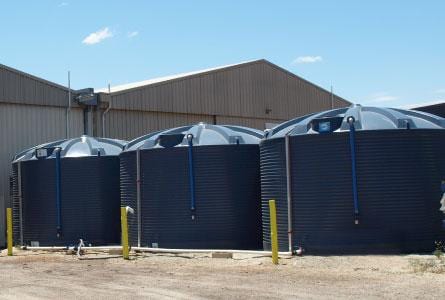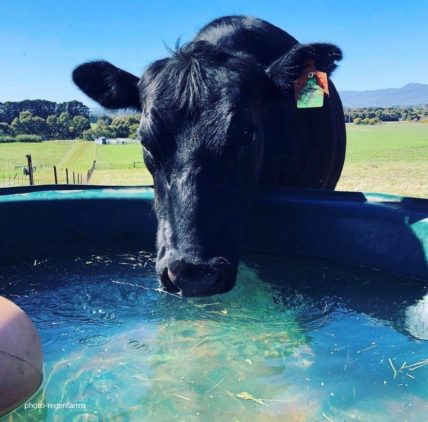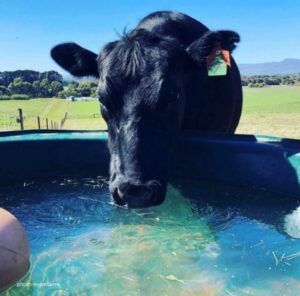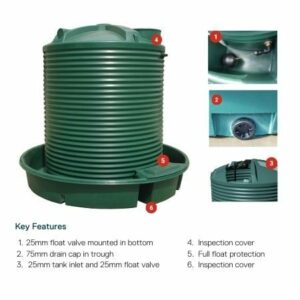Choosing the right stock water trough is important. In this guide we cover how material, sizes, maintenance, and more, can affect your choice.
Drinking water is essential for our health and well-being, and just as we like taking care of ourselves, we wouldn’t think of drinking dirty water, so neither should our livestock. How do you maintain healthy, clean drinking water for your livestock? By investing in the right stock water trough.
Choosing the best water trough can be difficult because you want to make sure you’re investing in a quality product. To help you, we have compiled some helpful information to make your decision easier.
What is a stock trough and who needs one?
Stock water troughs are used for providing water to farm stock such as cows, sheep, goats, horses, alpacas etc. Though it is not limited to just providing animals with water, people have recently been experimenting with DIY jobs and have found troughs also be helpful for a variety of other needs.
Uses of stock troughs:
- Providing animals with water
- Pools
- Garden beds/veggie gardens
- Drink coolers
- Ponds
Before purchasing a stock trough for your farm, you may be asking yourself specific questions to know which one is right for you. To make it easy, we have gathered information to help you make an informed decision when purchasing your water trough.
- What material are stock troughs made from?
- Do I need a stock trough if I have a dam?
- How does a stock trough work?
- How do you keep your stock trough cleaned and maintained
What materials are stock troughs made ?
Stock water troughs are typically made from one of three materials:
- Polyethylene – Convenient to move, easy to clean, UV resistant and will ‘bounce back’ to retain its shape against any unwanted behaviour from your stock.
- Concrete – Is the most common trough, ideal if you want it to stay in a permanent position. However, they are highly porous, hard to clean, and can deteriorate due to cattle saliva and enzymes found in their food.
- Metal – Allows movement among paddocks, although they should be placed under shelter as they are prone to rust. They can also be damaged by boisterous stock and can rust over time.
Do I need a trough if I have a dam?
Isn’t a dam just a massive water trough? Unfortunately, no. Providing stock with a water trough has a multitude of positive effects. Agriculture Victoria report that stock perform better when drinking from troughs.
Research indicates that when cattle are provided with high-quality water, they will:
- Drink more
- Eat more
- Gain weight quicker.
Because weight gain in livestock is a priority for farmers, it is worthwhile to ensure that stock water is of high quality.
- A trough means that stock has access to high-quality water. Dams often experience storm water run-off and animal manure.
- Stock will drink more water if they have a water trough compared to a dam. This is due to instincts that make them cautious of large bodies of water.
- Polyethylene troughs are easy to relocate and allows farmers to rest paddocks by easily moving stock to a different area.
The upside to this is that when stock has an increased intake of water, this will increase their dry matter intake, positively impacting their overall condition.
Depending on the herd size would depend on the size of your stock watering trough you purchase. Polymaster has a range of troughs for all sizes to meet your needs.
How do stock troughs work?
It is quite simple when you first receive your trough, you will connect your water system to the float valve. As it fills up, the ball will start to float. As it nears the top of the trough, the lever holds the inlet valve closed, and water will stop entering.
As the level drops, the ball valve will move down with the water. The lever then tilts and allows the inlet valve to open, causing the water to flow through until the trough is filled.
Polymaster’s stock troughs ball valve is protected in a protected case, unlike other stock troughs. So, you can rest easy knowing your it will not get damaged by stock or when relocating.
Pictured below is the SWT4500 Combination and key features
How do you keep your stock trough clean and maintained?
It is recommended that you clean your poly stock trough once every 3 days to ensure the quality of water provided to your stock is clean and drinkable.
Polymaster has a large range of quality water troughs ranging in size from 200ltr to 4500ltr. The entire range of stock water tanks are built to stand up in the harsh Australian conditions.
- Manufactured from food-grade polyethylene, it doesn’t require a protective liner and does not leach any harmful chemicals into your stocks clean drinking water over time.
- Unlike metal and concrete, Polymaster’s polyethene stock troughs are protected by a double-strength UV+ resin.
- Easy to relocate around your property, making rotational grazing easier on your farm all year round. Unlike concrete troughs that need to be placed in individual paddocks once built and placed.
The unique features of Polymaster Stock Watering Tank and Trough include:
- Float enclosure moulded as part of the trough
- Raised float allows trough to fill completely
- All pipework protected by trough surround
- Ribbed for added strength
- Slide up access cover with quick-lock pin which protects float
- High volume float valves available
To find more information about Polymaster’s range of stock water troughs, view the range here or find your nearest distributor using the store locator here.
More Similar News
View all News
How do I service and protect my Diesel and AdBlue® Bunded Tank?




